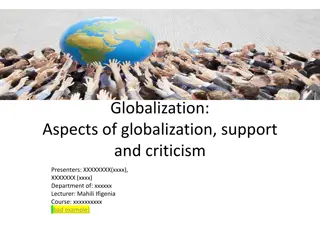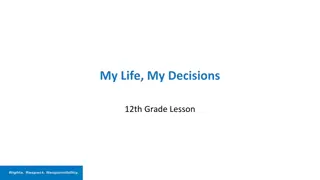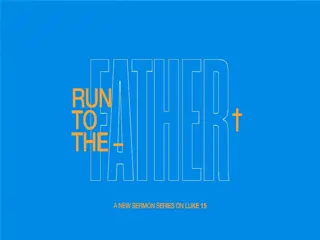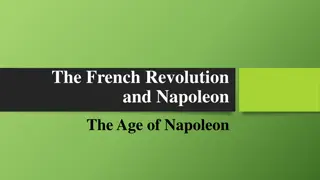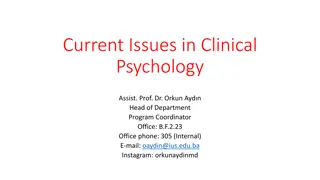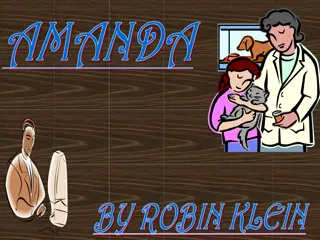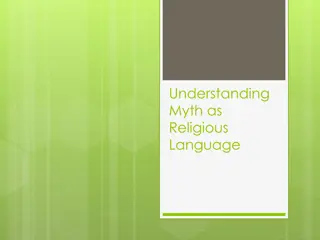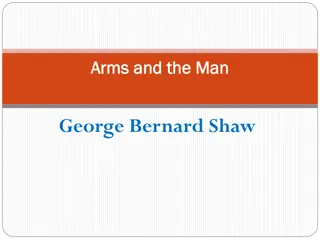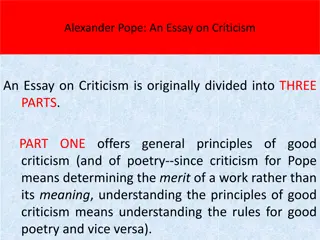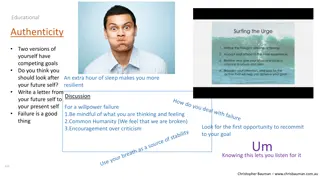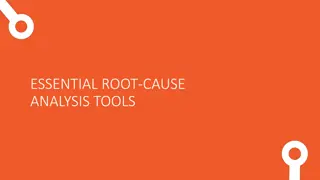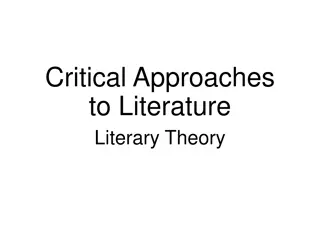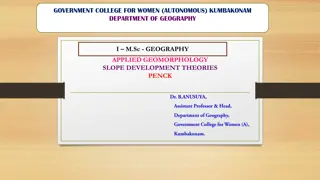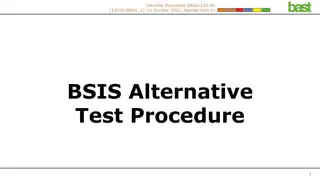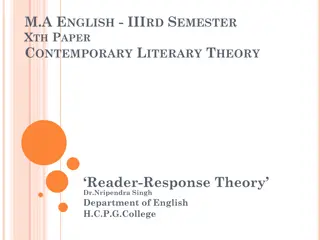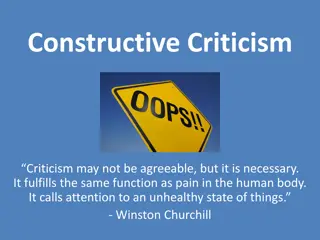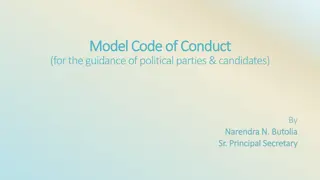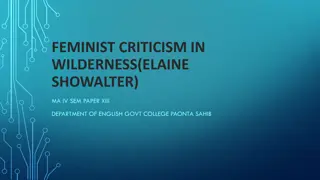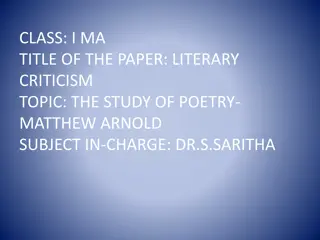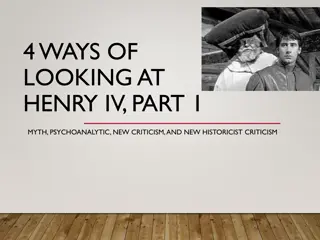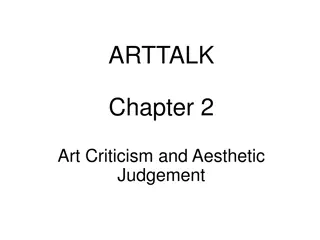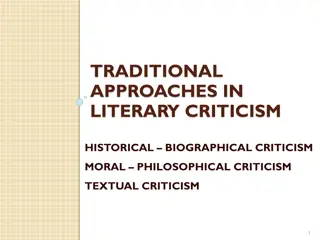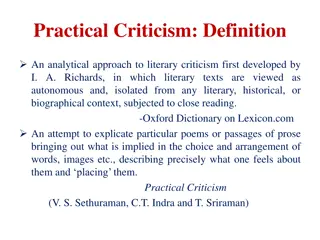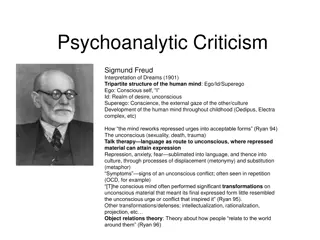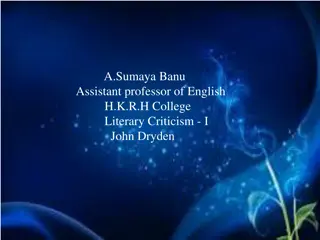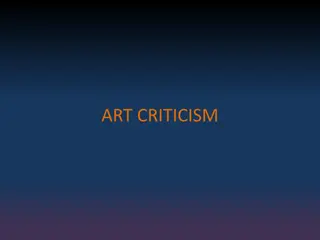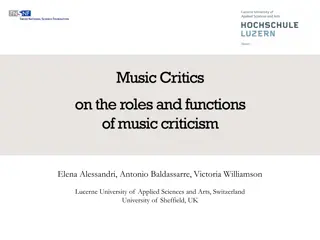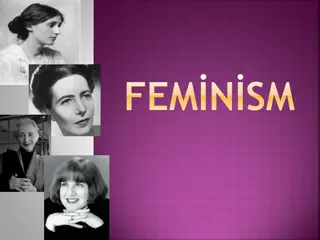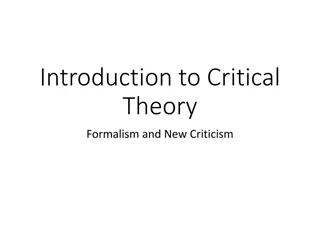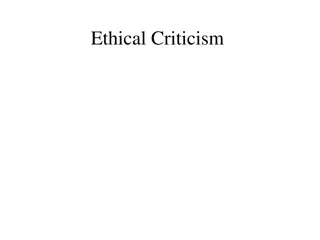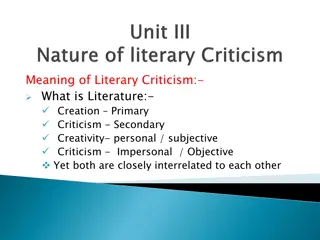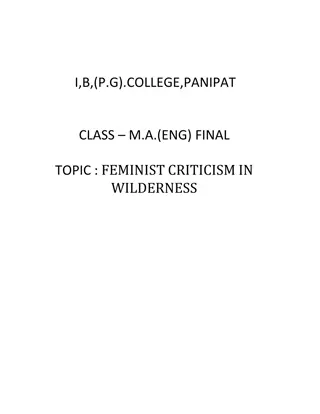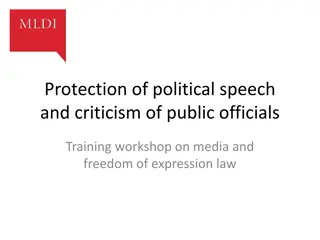Understanding Globalization: Aspects, Support, and Criticism
Globalization encompasses various aspects such as international integration, advances in transportation and telecommunications, interdependence of cultural and economic activities. The term has been widely used since the mid-1980s, leading to both support and criticism. While economic globalization
3 views • 25 slides
Challenging Situations in Relationships - What Would You Do?
Explore various dilemmas in relationships and personal beliefs through hypothetical scenarios involving disapproval from parents, coming out as gay to religious friends, advice on sex from peers and mentors, and dealing with criticism from close friends and family members. How would you navigate the
0 views • 7 slides
Guiding Others to Follow Jesus Through Compassion and Care
Tax collectors and sinners gathered around Jesus, sparking criticism from the Pharisees. Jesus teaches the importance of caring for the lost with parables of the lost sheep and coin. We are encouraged to emulate Jesus by visualizing, evangelizing, and prioritizing helping others to follow Him.
0 views • 16 slides
Rise of Napoleon: From Revolution to Empire
Napoleon's rapid ascent to power, from his early military career during the French Revolution to crowning himself Emperor in 1804, marked by strategic victories, political maneuvers, and absolute rule that garnered both admiration and criticism.
1 views • 34 slides
Training Models in Clinical Psychology: A Comprehensive Overview
Clinical psychology training models such as the Scientist-Practitioner Model have evolved over the years to integrate science and practical expertise. The Scientist-Practitioner Model, originating in 1949, emphasizes the fusion of scientific knowledge and clinical application. It faced criticism for
1 views • 98 slides
Robin Klein's Poetic Reflection on Childhood Innocence
Robin Klein's poem portrays the constant nagging of a little girl named Amanda by her mother for various perceived flaws. Amanda imagines herself as a mermaid, an orphan, and Rapunzel in response to the criticisms. The poem highlights the desire for freedom from continuous scrutiny and the impact of
1 views • 17 slides
Understanding Myth as Religious Language: Exploring Concepts and Interpretations
Explore the multifaceted nature of myths as religious language, delving into their equivocal definitions, truth claims about God, and use of rhetorical devices. Discover the significance of myths in providing human understanding of God, revealing divine attributes, and addressing fundamental questio
0 views • 17 slides
George Bernard Shaw: Influential Playwright and Social Critic
George Bernard Shaw, an Irish playwright, social critic, and political activist, is renowned for his witty language and social criticism in works like "Arms and the Man," "Pygmalion," and "Saint Joan." Shaw's influence on British socialist theory through Fabianism and his embodiment of realism in En
0 views • 25 slides
Overview of Alexander Pope's "An Essay on Criticism
Alexander Pope's "An Essay on Criticism" is divided into three parts discussing the principles of good criticism, offering solutions to critical problems, and identifying obstacles to good criticism. Part One delves into the challenges critics face due to partial judgments, false learning, and envy.
0 views • 17 slides
Nurturing Willpower and Overcoming Setbacks for Future Success
Embrace failure as a stepping stone, prioritize self-care with extra sleep, and foster resilience through challenges. Learn to forgive setbacks, listen to your future self's advice, and prioritize mindful perseverance towards goals. Recognize common humanity in struggles and seek encouragement over
0 views • 4 slides
Essential Tools for Root Cause Analysis
Root Cause Analysis is a crucial process in problem-solving. Two essential tools discussed here are Brainstorming and the 5 Whys Analysis. Brainstorming involves generating ideas in a group session without criticism, followed by sorting and evaluating these ideas. The 5 Whys Analysis helps to drill
0 views • 19 slides
Critical Approaches to Literature and Literary Theory
Explore different critical approaches to studying literature, including Reader-Response Criticism, Formalist Criticism, Psychological/Psychoanalytic Criticism, Sociological Criticism, and more. Dive into questions of how we read, interpret, and perceive meaning in texts, considering the impact of vi
1 views • 20 slides
Understanding Slope Development Theories by Walther Penck in Geomorphology
Explore the Slope Development Theories by Walther Penck in Geomorphology, focusing on concepts like Pendiplanation, Pedimentation, and the relation between endogenic and exogenic forces in shaping landscapes. Learn about the evolution of landforms and the criticism of the Davisian theory of Erosion
1 views • 28 slides
Alternative Test Procedure for Ensuring Driver Awareness of Endangered Bicyclists
GRSG-122-20 discusses Regulation 151-00, highlighting the need for timely information to drivers of heavy vehicles regarding nearby bicyclists. The main criticism addressed is the early signaling issue, proposing a new alternative test procedure for verifying Advanced Emergency Braking Systems. The
0 views • 39 slides
Understanding Reader-Response Theory in Literary Criticism
Reader-response criticism in literary theory emphasizes the reader's role in interpreting and creating meaning from a literary work. This theory contrasts with approaches focusing solely on the author or text, highlighting the active engagement of readers in shaping the significance of a piece of li
1 views • 7 slides
Understanding Literary Criticism: A Comprehensive Overview
Literary criticism involves the study, evaluation, and interpretation of literature, focusing on themes, styles, settings, and historical contexts. This discipline explores the meanings, workings, and values of literary works through interpretation, analysis, and evaluation. Various types of literar
2 views • 20 slides
Understanding Constructive Criticism in College
Constructive criticism plays a vital role in personal growth and development. It distinguishes between constructive and destructive feedback, highlighting the intent behind criticism and its significance in college settings. Embracing feedback positively can enhance one's learning experience and aca
1 views • 13 slides
Understanding the Model Code of Conduct for Political Parties and Candidates
Model Code of Conduct (MCC) is a set of norms developed in consensus by political parties and enforced by the Election Commission to ensure fair elections. It establishes guidelines for general conduct, meetings, processions, polling day, observers, parties in power, and election manifestos. The MCC
0 views • 33 slides
Critical Thinking in Islamic Methodology
Explore the concept of critical thinking in Islam, identifying key skills and understanding the importance of constructive criticism. Delve into the methodology of thinking in Islam that transcends superficial understanding, enabling individuals to distinguish between good and bad, correct and incor
2 views • 12 slides
Feminist Criticism in the Wilderness by Elaine Showalter - Analysis
Elaine Showalter's essay "Feminist Criticism in the Wilderness" delves into the realm of feminist literary critique, addressing the diversity among women writers and emphasizing the importance of considering factors beyond gender. Showalter highlights the challenges and goals of feminist criticism w
0 views • 13 slides
Matthew Arnold's Literary Criticism: The Study of Poetry
Explore Matthew Arnold's approach to literary criticism focusing on the study of poetry. Arnold's work as a critic of literature, society, and religion is discussed, emphasizing his three estimates of poetry - the Real Estimate, the Historic Estimate, and the Personal Estimate. The Real Estimate hig
0 views • 9 slides
Exploring Different Perspectives on Henry IV, Part 1 Through Myth, Psychoanalytic, New Criticism, and New Historicist Criticism
Delve into various critical lenses such as myth, psychoanalytic, New Criticism, and New Historicist Criticism to analyze Henry IV, Part 1. Uncover the mythic origins of characters like Falstaff, connections to ancient rituals, and the symbolism of killing the king. Discover how literature intertwine
4 views • 26 slides
Understanding Art Criticism and Aesthetic Judgement
Explore the world of art criticism and aesthetic judgement in Chapter 2 of ARTTALK. Discover the purpose of art criticism, learn to critique art, and understand aesthetic theories. Dive into the realm of professional critics, criteria for judgement, and the importance of forming your own opinions in
0 views • 38 slides
Traditional Approaches in Literary Criticism: An Overview
Literary studies in the early 20th century were influenced by traditional approaches like historical, biographical, moral, philosophical, and textual criticism. These approaches focus on external information to interpret literary works, connecting them to broader contexts in fields such as history,
0 views • 32 slides
Exploring Critical Theory Through Literary Criticism and Analogy
Delve into the realm of critical theory through literary criticism, using the analogy of different perspectives on seeing an orange to understand the various facets of analysis like reader response, Marxist/social power, feminist/gender, and psychoanalytic criticism. Discover how critical theory hel
0 views • 9 slides
Practical Criticism: Analysis and Appreciation of Poetry and Prose
Delve into the world of practical criticism and critical appreciation in BA III English studies with a focus on analyzing and appreciating poetry and prose. Explore the history, significance, and methodology behind this literary practice while gaining insights into interpreting unseen poems. Discove
3 views • 20 slides
Understanding Social Anxiety and Avoidant Behaviors
Social anxiety involves intense fear and avoidance of social situations, leading to catastrophic thinking and physiological reactions like performance anxiety. Individuals may anticipate criticism, rejection, or embarrassment, which can interfere with their functioning. This condition can manifest a
3 views • 30 slides
Understanding Practical Criticism in Literary Analysis
Analysis of Practical Criticism, an approach developed by I.A. Richards, involves close examination of literary texts without historical or biographical context. It aims to encourage students to respond to poetry and literature by focusing on form and meaning, identifying sources of pleasure. The pr
0 views • 16 slides
Overview of Psychoanalytic Criticism and Object Relations Theory
Psychoanalytic Criticism, originating with Sigmund Freud and further developed by Melanie Klein and Jacques Lacan, explores the intricate workings of the human mind, delving into the tripartite structure of the ego, id, and superego. The theory encompasses concepts such as the interpretation of drea
0 views • 10 slides
John Dryden's Literary Criticism and Works
A look into the literary criticism and works of John Dryden, focusing on his formal treatises, advocacy of the heroic couplet, defense of rhymed couplets in tragedy, and discussions on poetry and painting. Dryden's writings encompass a variety of genres and styles, from dramatic criticism to epic po
0 views • 23 slides
Matthew Arnold's Impact on Literary Criticism and Poetry Evaluation
Matthew Arnold, a prominent Victorian poet and critic, revolutionized literary criticism by emphasizing the importance of knowing and promoting the best ideas in the world through critical evaluation. He introduced scientific objectivity to criticism and influenced a generation of critics. Arnold sa
0 views • 25 slides
Understanding Art Criticism: A Comprehensive Guide
Delve into the realm of art criticism to grasp the essence of responding to, interpreting, and making critical judgments about artworks. Explore the steps of art criticism, from description to judgment, and learn how to analyze artworks in terms of elements and principles of art and design.
0 views • 17 slides
Russian Formalism and American New Criticism Overview
Russian Formalism, a literary movement that emerged in the early 20th century, was a radical departure from traditional approaches to literary analysis. It sought to define literary criticism as a scientific profession, focusing on the autonomy of literature and employing linguistics for support. Th
0 views • 22 slides
Roles and Functions of Music Criticism: Insights from Researchers
Exploring the various aspects of music criticism, this study delves into the role of critics in evaluating music performance, their criteria for assessment, and the impact of their reviews. Researchers interviewed English and German-speaking critics to gain insights into their perspectives and pract
0 views • 20 slides
Evolution of Feminist Literary Criticism: Challenging Patriarchal Ideals Through History
Feminist literary criticism challenges historical patriarchal views in literature from ancient Greek beliefs to modern writings. The roots of prejudice against women have been deeply embedded in Western culture, with notable works like Mary Wollstonecraft's "A Vindication of the Rights of Women" pio
0 views • 42 slides
Understanding Literary Criticism: Formalism and New Criticism
Literary critics analyze and interpret works of literature, delving into social and historical contexts. They focus on techniques, themes, and cross-disciplinary exploration. Formalism, a critical lens, emphasizes internal elements of a text over external influences, seeking universal meanings expre
0 views • 11 slides
Exploring Ethical Criticism and Literature's Human Possibilities
Ethical criticism in literary studies revolves around the intersection of ethics, literature, and criticism. It tackles concerns about the relationship between value judgments, ethics, and aesthetics, emphasizing the importance of reconnecting criticism with moral principles. Literature offers a dee
0 views • 21 slides
Understanding Literary Criticism: Exploring the Art of Interpreting and Evaluating Literature
Literary criticism, rooted in ancient Greek and Roman traditions, involves interpreting, analyzing, and evaluating literary works. It has evolved over time, encompassing various theories and approaches to engage with literature critically. From mimetic theory to analytical criticism, different persp
0 views • 11 slides
Feminist Criticism in Wilderness: Analyzing Elaine Showalter's Essay
The essay by Elaine Showalter delves into feminist literary criticism, exploring its aims, challenges, and the perception of being in "wilderness." Showalter discusses the evolution of feminist criticism, the need for a solid theoretical framework, and the hurdles faced by feminist critics. She emph
0 views • 14 slides
Protection of Political Speech and Criticism: Ensuring Freedom of Expression for Public Officials
Understanding the importance of freedom of speech in political discourse, this workshop focuses on the legal framework protecting political speech and criticism of public officials. Highlighting the rights and responsibilities in democratic societies, the content emphasizes the necessity of open deb
0 views • 14 slides
